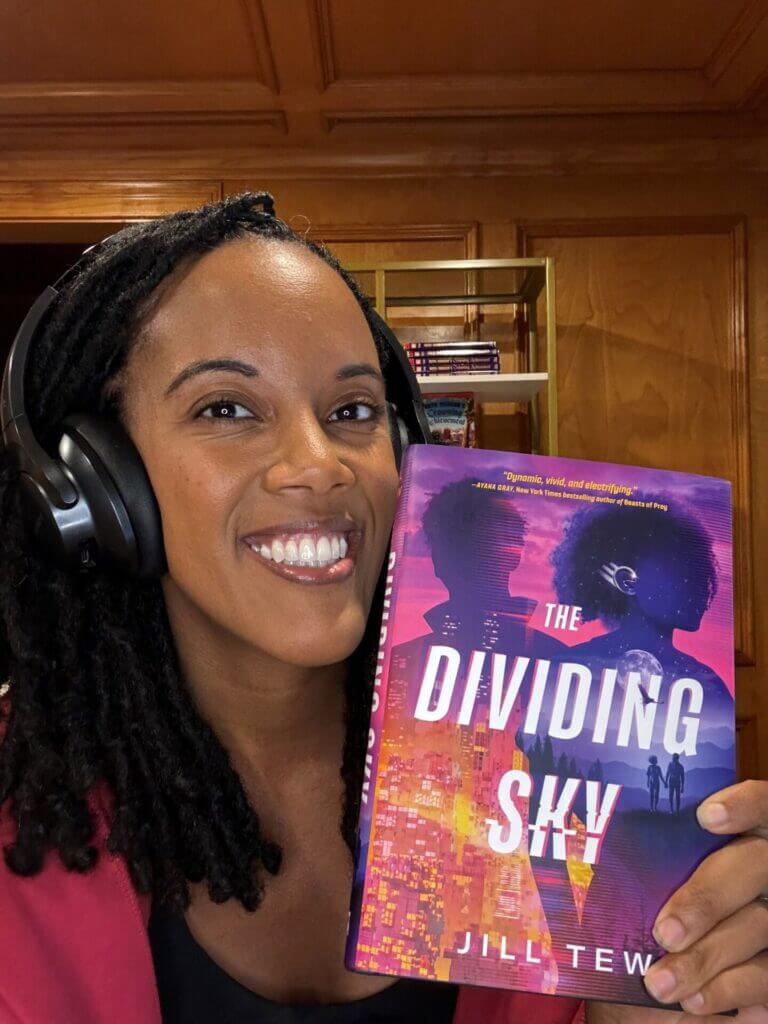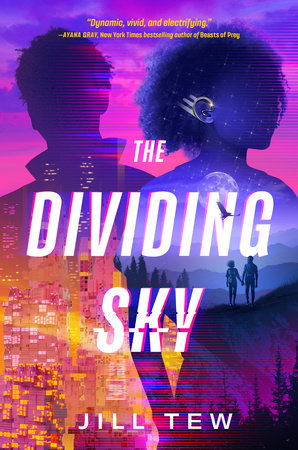
You’ve read romance and you’ve read dystopian, but have you read a dystopian romance? We asked Jill Tew, author of The Dividing Sky, to take us behind the scenes of her new, swoony dystopian romance.
Introduce yourself!
Hi! I’m Jill Tew, a middle grade and YA sci-fi author living in Atlanta, Georgia. When I’m not writing, I love baking, belting showtunes in my car, and spending time with my family.
What inspired you to write a romance?
I’ve loved romance, especially sci-fi romance, since I was a kid. I basically think I imprinted on the movie The Fifth Element at a young age and it was a wrap from there. There’s something about love persisting in the future, in these environments that we imagine to be cold and sterile or bleak and depressing, that I find really comforting.
I heard an author say once that a good romance is like a thesis statement—you have to lay out the pieces of the puzzle to prove to the reader that these two people absolutely must be together, despite the odds in their way. I love the challenge of setting up the obstacles and then making a compelling case over the course of the book so that by the end you’re banging down the door for these characters to reach their happily-ever-after.
What inspired The Dividing Sky?
Before becoming a full-time writer, I worked several high-demand jobs. There was always more work to be done, and I found myself outsourcing parts of my life—grocery shopping, pet care, laundry—in order to make more room. But I always filled whatever time I got back with more work, never with anything truly fulfilling. I found myself wondering about a world where technology advanced so much that we could potentially outsource every aspect of our lives . . . what if you could you pay someone—a Proxy—to go on a date with your boyfriend’s Proxy so you could stay at home working? At what point, if ever, would someone say enough is enough?
How would you describe your process for writing this book?
The Dividing Sky is the second manuscript I ever completed. It took me over six years to write my very first book, and it took three months to create the first draft of The Dividing Sky. I had a much better command of the basics of storytelling after struggling through that first manuscript, and I also think the plot for The Dividing Sky had been sort of percolating in my head in the background for a while.
I also plot my books beforehand, which was really important for this dual point of view story, since you have to figure out who tells which parts. In my non-writer days, I used spreadsheets a lot for work, and I still think they’re very useful! So I had big spreadsheet that went scene by scene, laying out whose perspective each scene was from, what would happen, any important details, etc. I go back and look at that spreadsheet sometimes when I want to feel nostalgic—or when I want to remind myself that first drafts and outlines can be messy and everything will work out!
How have you celebrated the release of your debut novel?
Historically I’ve been really bad at celebrating writing wins. Like a lot of writers, I tend to just move on to the next goal. Finished the draft? Time to revise. Done revising? Time to query. Got an agent? Let’s submit to publishers. But the weekend before The Dividing Sky came out, it finally hit me that I was about to complete a goal that I set out to accomplish literally ten years ago. I took about a week to really just soak up that moment, and I’m so glad I did.
Share an out of context quote from your book. (no spoilers!)
By far, my favorite quote in the book is: “I’m not going to say anything. But you know what I could say, right? Because there’s a lot I could say right now.”


